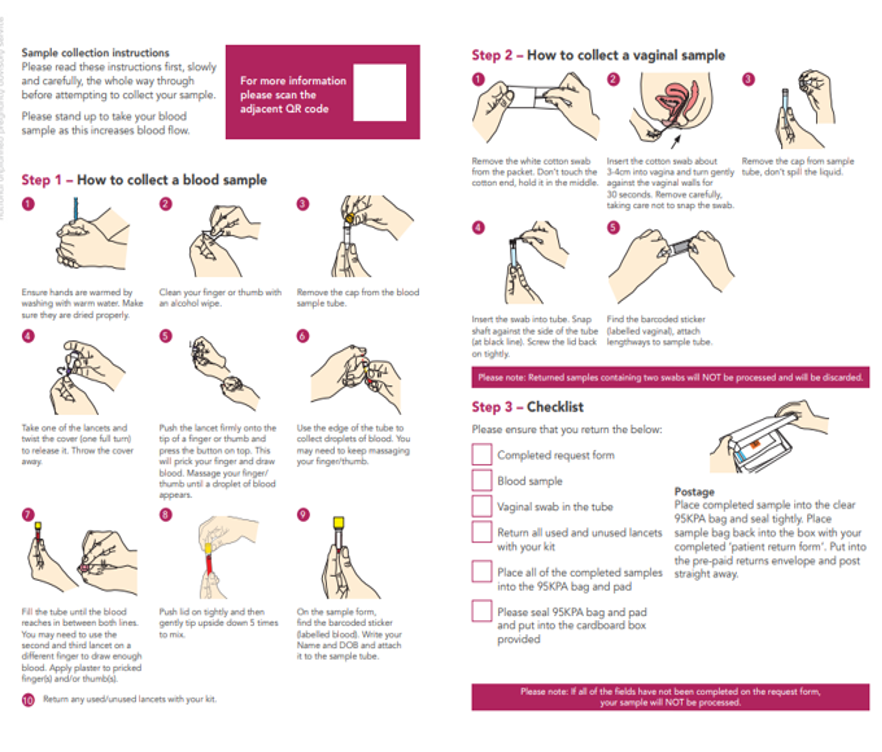Looking after your sexual health
A Sexually Transmitted Infection (STI) is an infection passed on through sexual activity.
STls can spread through:
- Unprotected vaginal sex
- Unprotected oral sex
- Unprotected anal sex
- Sharing sex toys
- Close genital contact
Did you know that the most common symptom of an STI is no symptoms? Many people that have an STI don’t realise. STls can lead to long-term health problems if they are not treated. These problems include pelvic inflammatory disease (PID) or infertility (not being able to get pregnant).
Doing an STI test is the only way to know if you have an STI. A test is recommended if you have had unprotected sex, have a new partner or if your partner may have had sex with someone else.
Some STIs increase the risk of an infection after an abortion. At your abortion appointment we will offer you screening tests for:
- Chlamydia
- Gonorrhoea
- HIV
- Syphilis
How We Test for STIs at NUPAS
Taking samples for STI tests
Our STI tests are very quick. All we need is a finger prick blood sample, urine sample or small cotton bud swab of vaginal discharge – please see diagrams below. The swabs may feel uncomfortable but shouldn’t be painful.

STI Test Results
Test results may be available the same day. Some results can take a couple of weeks to come back. Your privacy is very important when we handle your test results. We will ask you how you would like the results to be sent to you.
It’s a good idea to avoid having sex or close sexual contact until you get your test results.
If You Test Positive
If you are diagnosed with an STI, try not to worry. Most STls are easy to treat with antibiotics. You will be asked to avoid sex until after the infection is treated. This will stop reinfection or passing the infection to someone else.
If you have an STI, it’s important to tell your recent sexual partner(s) from the last 6 months. They will need to get tested and may be offered treatment too. We can support you to identify and contact them.
To maintain your sexual health and the safety of both you and your partners, STI testing is essential. It doesn't matter how often or what kind of sex you're having—anyone may get an STI.
Testing for STIs should be done frequently if you are sexually active or you have multiple sexual partners. And keep in mind that STIs frequently exhibit no symptoms! To avoid STIs from resulting in long-term health issues, it's critical to ensure that they are identified and treated as soon as feasible.
In some cases, ordering home kits from sexual health clinics can be more convenient and discrete, however visiting your GP or a clinic is also advised. At NUPAS, we do STI screenings for clients receiving abortion care.
For chlamydia depending on your sex, you’ll be asked for:
- People with Penises: A urine sample
- People with Vaginas: A swab of the vagina
For HIV, a small blood sample is required with a prick to the finger.
To test for Pubic Lice, a physical examination will determine if positive.
To be tested for syphilis, a visit to your GP will be required. A swab of any sores will be taken, but depending on symptoms, blood tests may be required.
For a Gonorrhoea test, similar to chlamydia, a swab or urine sample can be taken.
To see if you’re eligible for a home STI kit, visit Brook.
The vaginal swab test for chlamydia and gonorrhoea can be performed at any time throughout your menstrual cycle, including during your period and regardless of the volume of your flow.
While it could make taking the sample a little more difficult, your period won't affect the outcome.
It’s always a good idea to regularly test for STIs, even if you aren’t showing any symptoms. 50% of males and 75% of females with chlamydia don't exhibit any overt symptoms, and other infections may not show any symptoms at all. Have peace of mind with an STI test and stay safe.
Preventing STIs
Protection
Condoms are the only contraception that protects against STIs. We offer all our patients condoms to take away with them.

Future STI testing
Talk to your partner about getting tested and staying sexually healthy. If you have a new partner, it is a good idea for you both to be tested for STIs before having sex. Although we can’t offer you STI tests after your abortion care is complete, you can get tests and treatment any time from:
- A contraception and sexual health (CaSH) clinic
- A specialist service like Brook (for under 25s)
- Your GP surgery.
See the NHS Choices website for local services.

